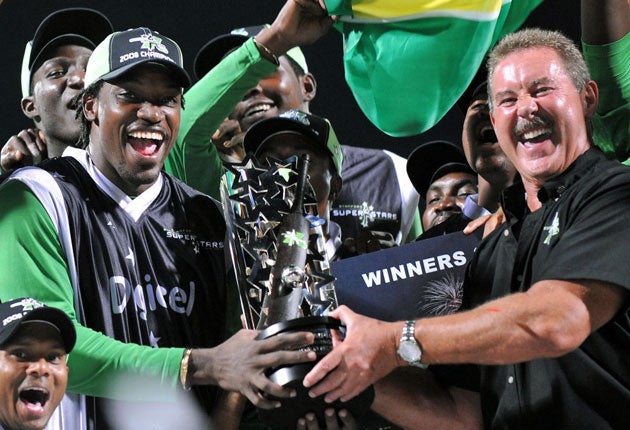Charged with fraud, man who bankrolled cricket
US police raid Sir Allen Stanford’s offices as depositors pull money from Antigua bank

Your support helps us to tell the story
From reproductive rights to climate change to Big Tech, The Independent is on the ground when the story is developing. Whether it's investigating the financials of Elon Musk's pro-Trump PAC or producing our latest documentary, 'The A Word', which shines a light on the American women fighting for reproductive rights, we know how important it is to parse out the facts from the messaging.
At such a critical moment in US history, we need reporters on the ground. Your donation allows us to keep sending journalists to speak to both sides of the story.
The Independent is trusted by Americans across the entire political spectrum. And unlike many other quality news outlets, we choose not to lock Americans out of our reporting and analysis with paywalls. We believe quality journalism should be available to everyone, paid for by those who can afford it.
Your support makes all the difference.Federal regulators in the United States have charged Sir Allen Stanford and two associates with a “massive” $8.5bn (£6bn) fraud at his Antigua-based bank, sending fresh shock waves through Wall Street as well as the world of cricket where he had emerged in recent years as a generous – if controversial – sponsor.
Agents with the FBI and other federal departments raided the Houston headquarters of the Stanford Group, demanding documents and interviewing staff about the alleged fraud. The bank in Antigua, the Stanford International Bank, is part of the group.
The Texan-born billionaire and two of his aides failed to answer subpoenas to testify about the fraud, and last night the US government said it was unable to comment on Sir Allen’s whereabouts. The Securities and Exchange Commission, which filed the criminal charges, began investigating the bank some months ago in response to suspicions it was paying rates of return to its clients on so-called certificates of deposit far in excess of what was considered realistic.
When news of the inquiry surfaced last week, some anxious depositors flew to Antigua to withdraw their money, fearful that Sir Allen might emerge as the next Bernard Madoff, the New York money manager who ran a $50bn Ponzi scheme.
Sir Allen, who lives in the US Virgin Islands, had been “orchestrating a fraudulent, multibillion dollar investment scheme”, the SEC said. As well as filing the charges, the SEC froze his assets and appointed a receiver to protect clients’ assets. The bank is listed as having $8bn in assets and 30,000 clients.
Rose Romero, a regional director for the SEC in Texas who oversaw the raids in Houston, said: “We are alleging a fraud of shocking magnitude that has spread its tentacles throughout the world.” Also charged yesterday were the Stanford Group’s chief financial officer, James Davis, and chief investment officer, Laura Pendergest-Holt.
The prospect of an unravelling of the Stanford empire could be deeply destabilising for Antigua. Aside from Stanford International, the Bank of Antigua is also owned by the tycoon, who is worth about $2.2bn.
Sir Allen has long been a key benefactor of West Indies cricket. Last year, however, he burst on to the international scene as the promoter behind the so-called Twenty20 for Twenty Tournament, pitting a West Indian team, the Stanford Superstars, against England players. He offered $1m for each member of the winning team and a $20m prize fund in total.
While the tournament went ahead as planned, it was seen by some in the sport as breaking new ground in unwelcome commercialism, if not tackiness. In one of his more flamboyant moments, the billionaire landed at Lord’s cricket ground in London in a gold-plated helicopter trailing a clear chest stuffed with $20m in banknotes.
The England and Wales Cricket Board (ECB) said yesterday that it was suspending all further talks with Sir Allen on future sponsorship. The ECB has a five-year deal to play against the Stanford Superstars. In Antigua last November, the Superstars won the inaugural tournament. The ECB chairman, Giles Clarke, defended the original deal yesterday. “We believed he could pay the prize money he was offering and that money was paid into bank accounts in advance,” he told the BBC.
The SEC complaint ran over 25 pages and alleged a string of lies told by the Antigua bank to its clients, including an assertion that it had no exposure to the Madoff debacle. The SEC says that, to the contrary, the bank had $400,000 in Madoff funds. The complaint notes that in 1995 and 1996, the Antigua bank offered identical – and inexplicable – rates of return of 15.71 per cent on certificates of deposit. It adds that Sir Allen and Mr Davis have “wholly failed to co-operate with the commission’s efforts to account for the $8bn of investor funds purportedly held by” Stanford International Bank.
The horror for clients of Stanford International, meanwhile, is that if fraud has been committed, they may find their deposits have been vaporised. While the focus was on Stanford International, there were worries about the condition of the group as a whole, which manages $51bn in assets. Those in the financial industry who have for years competed for clients against Stanford and his fabulous rates of interest may not be surprised. Russ Dallen, a former head of Oppenheimer & Co’s business in Caracas, Venezuela, told The Huffington Post that Sir Allen wooed his clients with promises of “14 per cent on savings, guaranteed. We were gobsmacked because guaranteeing those kinds of returns is not possible.”
Join our commenting forum
Join thought-provoking conversations, follow other Independent readers and see their replies
Comments